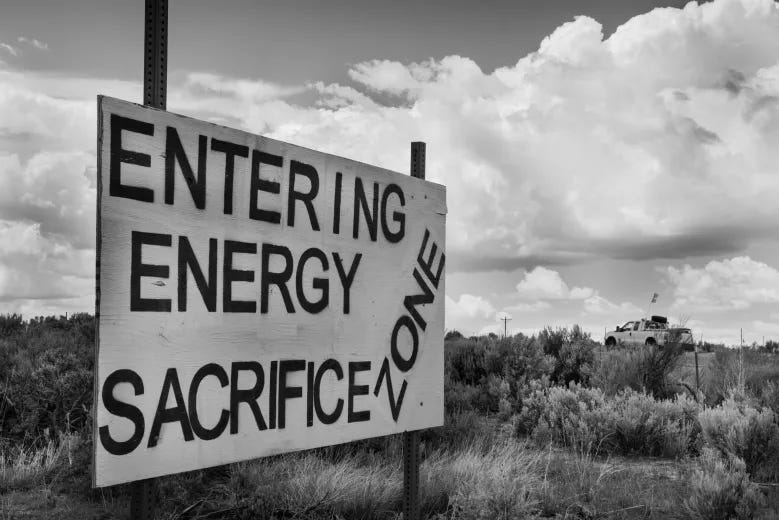The Thin Green Line
New Mexico Convenes the State's First Environmental Crime Task Force
Environmental crime is on the rise both in America and worldwide. While the Biden EPA is doing its best to ramp up enforcement after the polluter-friendly Trump years, some states see a need to also bolster local eco-policing.
“You can’t say you have the nation’s best ozone rules for oil and gas unless you’re able to enforce them,” said James Kenny, secretary of New Mexico’s Environment Department. “We’re seeing large-scale noncompliance in many of our regulatory programs.”
So, with the goal of increasing federal, tribal and state cooperation in prosecuting criminal violations of environmental laws, New Mexico has convened a state-level environmental crimes task force and put Bruce Baizel in charge. Baizel spent 18 years holding oil and gas extractors accountable as the Director of Earthwork’s Energy Program. Baizel recently spoke to Black Rhino Media about the task force’s goals and direction.
Black Rhino Media: What is your role with the task force?
My specific role is as general consul to New Mexico Environment Department. I manage the attorneys in that department and because of that, I have a pretty good feel for what’s happening in the department.
What’s the most common environmental crime committed in New Mexico?
There’s not a good numerical answer to that, but in our first meeting there were some common areas mentioned independently by different agencies. The oil and gas sector came up several times. Another was organized crime. But what was meant by “organized crime” was varied.
And then wildlife. That was an area where illegal activity and criminal activity was fairly common. Specifically, endangered species and the movement of species into and out of New Mexico. Related, was the use of pesticides and herbicides that would impact wildlife if used illegally.
What’s the most damaging in terms of impacting water, air, and natural resources?
In the air sector we have several areas of the state with ozone issues and that impacts a large number of people. Oil and gas being significant source of those emissions. Not as widespread – but significant is the long term impact of legacy waste around Los Alamos and other military bases.
The Department of Justice’s Environment and Natural Resources Division Assistant Attorney General Todd Kim made this statement last year:
“Although we may have fewer criminal cases than civil cases, criminal prosecutions are an indispensable and powerful deterrent to illegal behavior. A genuine threat of criminal prosecution can and will change the conduct of individuals and corporations who would not be deterred by the threat of civil enforcement alone.”
What are your thoughts on Mr. Kim’s statement?
I generally agree with it. My experience in compliance prior to coming to the department and trying to get regulations enforced was that if the penalty for non-compliance is a relatively small monetary fine that the company is going to pay, oftentimes that behavior just continues and is considered the cost of doing business.
When you have criminal penalties that may be levied…the fact that you might end up in jail gets people’s attention. And you start getting broader -- particularly corporate concern --- if in fact they were brought into a criminal case. I think it changes and broadens those risks for those committing violations in a way that gets their attention more than just fines.

Do you worry about the politics of regulation?
You always have politics. You’re never going to get 100 percent compliance. It’s whether you get more or less compliance. We’d like to get much more compliance in some of these sectors in New Mexico. The politics are always there. I think at this point given recent events more compliance is in the cards politically, so I think we will be pushing ahead to get more funding to get more inspectors so we can bring about compliance on the civil side. In some instances, refer cases to the agencies that can do criminal prosecution if that is warranted. On a whole, there is widespread support for that.
How important was your time at Earthworks and working on the oil gas accountability project to fronting the task force?
It gave me exposure to a lot of the real-world behavior in a sector that is very impactful.
You mentioned organized environmental crime as a topic of the task force’s first meeting. Internationally, organized environmental crime is on the rise according to INTERPOL. When I talked to the EPA about INTERPOL’s findings they told me it was a small slice of US green crimes – but still happening here. Is there an organized crime element to New Mexico environmental crimes?
I don’t think we have a very good handle on it yet. Where we see it appear is mundane things, like tearing out a building for asbestos with a crew without PPP. If you have a corporate entity making more money because their workers are not properly protected, that’s where we see more organized criminal activity.
Another example is an organized set of chop shops for stolen vehicles and they are dumping parts of vehicles that have hazardous materials.
Final question. What about banned chemicals coming across the Mexican border?
We did discuss that in the task force and that’s an area that needs more participation especially around banned pesticides.
To learn more about EPA’s efforts to fight environmental crime, sign up for the agency’s quarterly crime bulletin here. And keep an eye out for more Flower Power Roundup posts from Black Rhino Media where I go in depth on crimes detailed in the EPA bulletin.



